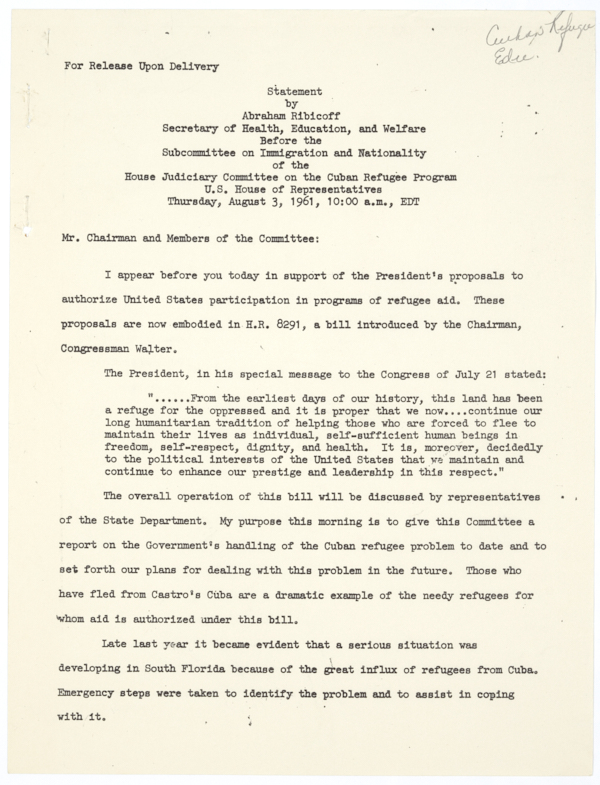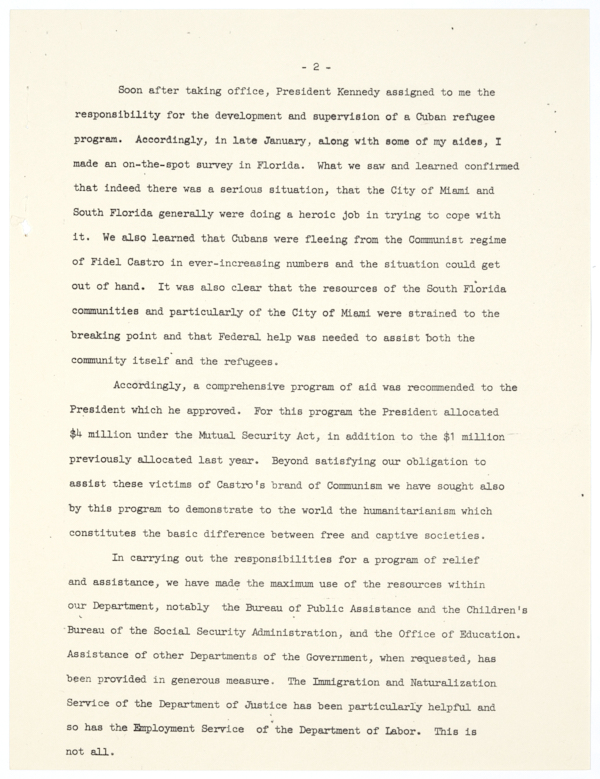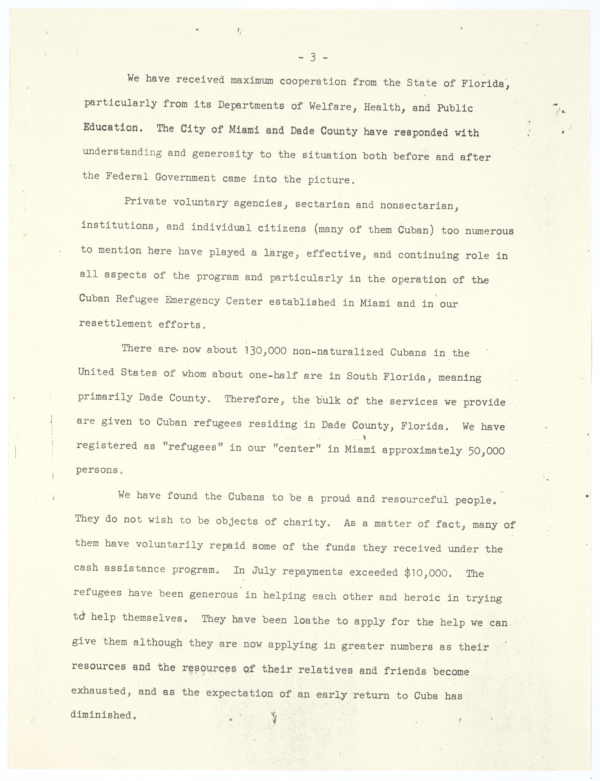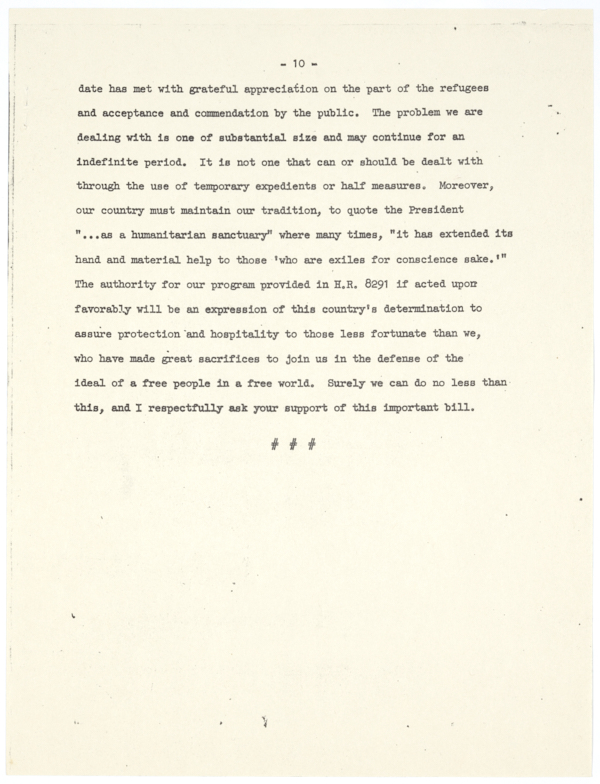Transcript
For Release Upon Delivery
Statement by
Abraham Ribicoff
Secretary of Health, Education, nd Welfare
Before the
Subcommittee on Immigration and Nationality
of the
House Judiciary Committee on the Cuban Refugee Program
U.S. House of Representatives
Thursday, August 3, 1961, 10:00 a.m., EDT
Mr. Chairman and Members of the Committee:
I appear before you today in support of the President’s proposals to authorize United States participation in programs of refugee aid. These proposals are now embodied in H.R. 8291, a bill introduced by the Chairman, Congressman Walter.
.
The President, in his special message to the Congress of July 21 stated:
“......From the earliest days of our history, this land has been a refuge for the oppressed and it is proper that we now….continue our long humanitarian tradition of helping those who are forced to flee to maintain their lives as individual, self-sufficient human beings in freedom, self-respect, dignity, and health. It is, moreover, decidedly to the political interests of the United States that we maintain and continue to enhance our prestige and leadership in this respect.”
The overall operation of this bill will be discussed by representatives of the State Department. My purpose this morning is to give this Committee a report on the Government’s handling of the Cuban refugee problem in the future. Those who have fled from Castro’s Cuba are a dramatic example of the needy refugees for whom aid is authorized under this bill.
Late last year it became evident that a serious situation was developing in South Florida because of the great influx of refugees from Cuba. Emergency steps were taken to identify the problem and to assist in coping with it.
-2-
Soon after taking office, President Kennedy assigned to me the responsibility for the development and supervision of a Cuban refugee program. Accordingly, in late January, along with some of my aides, I made an on-the-spot survey in Florida. What we saw and learned confirmed that indeed there was a serious situation, that the City of Miami and South Florida generally were doing a heroic job trying to cope with it. We also learned that Cubans were fleeing from the Communist regime of Fidel Castro in ever-increasing numbers and the situation could get out of hand. It was also clear that the resources of the South Florida communities and particularly of the City of Miami were strained to the breaking point and that Federal help was needed to assist both the community itself and the refugees.
Accordingly, a comprehensive program of aid was recommended to the President which he approved. For this program the President allocated $4 million under the Mutual Security Act, in addition to the $1 million previously allocated last year. Beyond satisfying our obligation to assist these victims of Castro’s brand of Communism we have sought also by this program to demonstrate to the world the humanitarianism which constitutes the basic difference between free and captive societies.
In carrying out the responsibilities for a program of relief and assistance, we have made the maximum use of the resources within our Department, notably the Bureau of Public Assistance and the Children’s Bureau of the Social Security Administration, and the Office of Education. Assistance of other Departments of the Government, when requested, has been provided in generous measure. The Immigration and Naturalization Service of the Department of Justice has been particularly helpful and so has the Employment Service of the Department of Labor. This is not all.
We have received maximum cooperation from the State of Florida, particularly from its Departments of Welfare, Health, and Public Education. The City of Miami and dade County have responded with understanding and generosity to the situation both before and after the Federal Government came into the picture.
Private voluntary agencies, sectarian and nonsectarian, institutions, and individual citizens (many of them Cuban) too numerous to mention here have played a large, effective, and continuing role in all aspects of the program and particularly in the operation of the Cuban Refugee Emergency Center established in Miami and in our resettlement efforts.
There are now about 130,000 non-naturalized Cubans in the United States of whom about one-half are in South Florida, meaning primarily Dade County. Therefore, the bulk of the services we provide are given to Cuban refugees residing in Dade County, Florida. We have registered as “refugees” in our “center” in Miami approximately 50,000 persons.
We have found the Cubans to be a proud and resourceful people. They do not wish to be objects of charity. As a matter of fact, many of them have voluntarily repaid some of the funds they received under the cash assistance program. In July repayments exceeded $10,000. The refugees have been generous in helping each other and heroic in trying to help themselves. They have been loathe to apply for the help we can give them although they are now applying in greater numbers as their resources and the resources of their relatives and friends become exhausted, and as the expectation of any early return to Cuba has diminished.
-4-
On the whole, the refugees are a well-educated group. Over one-third belong to the professional, semiprofessional, or managerial categories. Only a small fraction have no special skills. Three-fourths are between the ages of 20 and 50.
A basic policy in these programs has been a decision to leave to these refugees the maximum leeway in deciding what they wish to do with themselves while they are with us, and where they wish to do it. We have concluded--firmly, I must say--that it is unthinkable that we should set up refugee camps or engage in activities that might serve to produce and perpetuate a psychology of dependency.
To relieve pressure on the over-burdened community of Miami, we have placed stress on resettlement in other parts of the country. For those who find resettlement impractical and for those for whom we have not as yet been able to find a suitable resettlement opportunity, we have made provision for supplying the necessities of life. The level of help in the various categories is similar to that provided our own nationals in Florida who find themselves in similar economic circumstances.
In the past 6 months financial assistance and other welfare services have been provided to those needing them. In this period some24,000 persons have been helped with cash assistance in the amount of $2.5 million; about 40,000 have been given medical attention and care in varying degrees. Surplus food has been made available to many thousands as well as summer recreational opportunities to children.
We have resettled in virtually every State of the Union and in Puerto Rico approximately 6,000 persons at a cost of about $600,000. In practically each case, a suitable job has been found.
We have cared for nearly 700 children who are unaccompanied by parents or other responsible persons at a cost of about $500,000.
An education program, largely developed by the Office of Education and the public school system of Dade County, has provided schooling for about 5,000 Cuban youngsters. We have contributed something over $1 million to Dade County’s school budget. We have made loans in the amount of $108,000 to nearly 400 Cubans students attending 51 colleges in 22 States. We have arranged, Largely at Federal expense, for a variety of courses for adults, mainly in language training and in subjects which enable these people to equip themselves for gainful employment and adapt themselves more readily to our way of life. We have made arrangements with the University of Miami to provide professional training for Cubans doctors and lawyers, to establish a roster of Cuban professors, and to establish research projects which can usefully occupy the talents of Cuban scholars.
The Employment Service of the U.S. Department of Labor has provided services to assist the refugees in seeking and obtaining employment. With due regard for the sensitive problems involved, registers of personnel and skills are used locally and nationally in locating and developing employment opportunities for the refugees. This work and these services are coordinated closely with the resettlement service of the voluntary agencies to the end that effective and satisfying resettlements can be brought about. Total expenditures for the program as a whole from its beginning in December 1960 to June 30, 1961 amounted to be about $4 million. Expenditures in July 1961 been about $1.1 million. Direct Federal expense in the administration of this program had been held to 4 percent of total expenditures.
-6-
So much for the past. Now, I wish to comment upon the requirements of the future. Our experience of the past several months suggests that our program is soundly based, and with appropriate modification to meet new situations will serve to meet future needs.
In the initial stages of our program and until the failure of the landing in April it was quite clear that the refugees, particularly those in Florida, would be unwilling to commit themselves to long-range decisions. To most of these people the early demise of the Castro regime was not only something to hope for; it was something they believed quite imminent. Thus, the plans of the great majority were shaped by their intense desire to return to their homeland and to rebuild new lives out of the ashes of the past.
Now the situation has changed. It has now become increasingly evident that we cannot continue to rely upon the Miami area or even upon Florida to absorb an unlimited number of people who, despite their pride, their dignity, and their desire for self-reliance must of necessity look to the resources immediately at hand to maintain themselves. No matter how well disposed a local community may be, there is a limit to its capacity to provide shelter, employment, and health and educational facilities to a rapidly increasing, temporary population of such substantial proportions.
Circumstances such as these lead us to the practical necessity of developing future programs that will enable our Cuban friends to carve out new lives for themselves which, as they might choose, could be adjusted either to an indefinite stay or to permanent residence in the United States.
We propose to accomplish and to accommodate themselves to our way of life. Education and employment are keystones of the program which we envision for the future. Our educational plans include language
-7-
training as a fundamental need for all those who come to us with an inadequate knowledge of English. We would offer, in addition, refresher courses for those who must transfer a professional discipline, such as the practice of medicine, from one country to another; vocational education for those whose desire and capacity suggest training in what direction; and loans for undergraduate and graduate education. Without such help obtaining employment becomes extremely difficult, and without employment successful adjustment to our way of life is impossible.
Until such time as resettlement becomes a practical possibility for a refugee we, of course, would propose, as we have in the past, to accept our responsibility for furnishing the necessities of life. In my judgment, however, it is important both to us and to the refugees that our help should not be so conceived or conducted as to encourage dependence as a way of life. I am told by those who have experience in handling refugee problems in many countries that the curse of the refugee camp is the tendency to develop a permanent refugee psychology in the minds of those who remain too long within its protection. A similar attitude, one of reliance upon others, develops also among those who accept assistance beyond a reasonable period of adjustment.
The refugee center established in Miami last February would, of course, be continued. This center serves as the focal point for registration, resettlement, and relief activities and for the coordination of federally supported services with those provided under other auspices.
We have no present plan for extending the major services of our program to refugees located outside the Miami area. I should like to
-8-
explain in this respect that the Federal program, while recognizing that the well-being of refugeesis essentially a national responsibility, was restricted to the Miami area because it was clearly demonstrated there that the needs of the refugees represented burdens, financial and otherwise, clearly beyond the capacity of the local community to deal with. Our experience leads me to believe that this was a sound policy although we fully recognize that in a few other sections of the country some sacrifices have had to be made in assuring that the refugees are adequately provided for. Those communities are to be commended warmly for their generous acceptance of their obligations.
I have already stated that resettlement is a difficult problem. This was anticipated. It is not easy for people already overwhelmed with the disruption of their lives to strike out again alone in a strange country with a strange language. In the face of these and other handicaps the voluntary agencies upon whom has rested the major burden of resettlement have done a wonderful job. It is a job that must be continued and expanded.
We hope that in the future we will be able to extend and improve our job-placement services as a basis for further resettlement.
We hope also that we will be able to work out plans that will enable refugees leaving Cuba to go immediately to reception points other than those in the Florida area. This would enable us to accommodate them more readily and more satisfactorily.
Our educational programs should be expanded substantially. These people, properly prepared and trained, can be a tremendous asset to the United States and to a free Cuba in the future. By the same token, they are a tremendous loss to Castro’s dictatorship. For those whose professional
-9-
Education has been interrupted, as well as those with qualifications and desire to enter the professions, we must provide the help that will enable them to make their full contribution in their respective fields of endeavor. We would propose to do this by contributing to both education and maintenance costs. A doctor, a dentist, a lawyer, or an architect can neither make a living for himself nor can he make a contribution to our society unless he is equipped to engage in his profession in this country. We want to help him equip himself. Similarly, for those who wish to acquire or improve their skills in other occupations, we propose to sponsor their training in vocational skills and thus assure them the opportunity for a productive life in the employment of their choice,
In our future plans we have also given serious consideration to a grant project which I am convinced will be helpful in stimulating resettlement and which at the same time will provide an opportunity for qualified refugees to maintain themselves to community life. These grants would be used to pay for the compensation of qualified refugees who would be employed on useful research or similar projects by nonprofit, public, or private agencies such as universities. We have already had some requests of this nature from institutions and agencies which are anxious to be of service in the task of resettlement and who at the same time, while lacking the necessary funds, are in a position to purpose deserving projects suitable to the capacities of a substantial number of the refugees.
To Summarize, Mr. Chairman and members of the Committee, there is clear evidence of a continuing and consistently growing need of a Federally supported program of aid for Cuban refugees. The program to
-10-
date has met with grateful appreciation on the part of the refugees and acceptance and commendation by the public. The problem we are dealing with is one of substantial size and may continue for an indefinite period. It is not one that can or should be dealt with through the use of temporary expedients or half measure. Moreover, our country must maintain our tradition, to quote the President “...as a humanitarian sanctuary” where many times, “it has extended its hand and material help to those ‘who are exiles for conscience sake.’” The authority for our program provided in H.R. 8291 if acted upon favorably will be an expression of this country’s determination to assure protection and hospitality to those less fortunate than we, who have made great sacrifices to join us in defense of the ideal of a free people in a free world. Surely we can do no less than this, and I respectfully ask your support of this important bill.

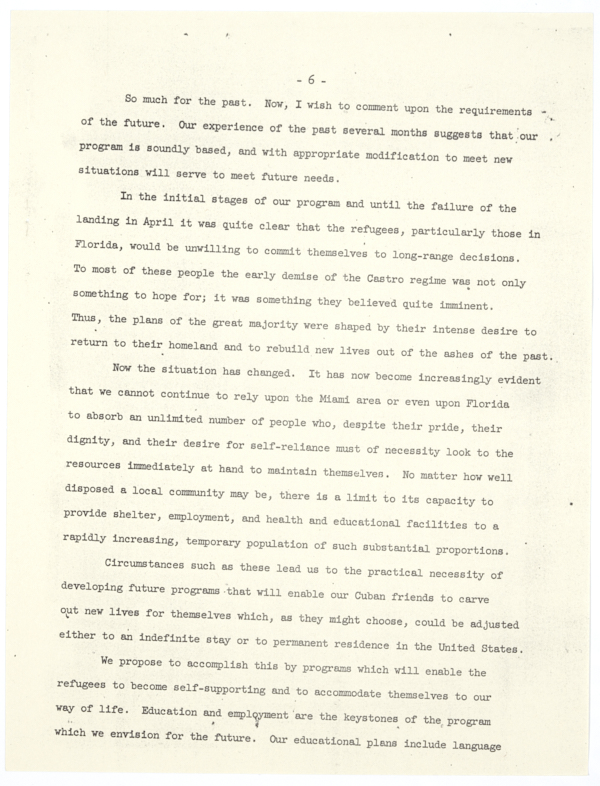
 Listen: The Latin Program
Listen: The Latin Program